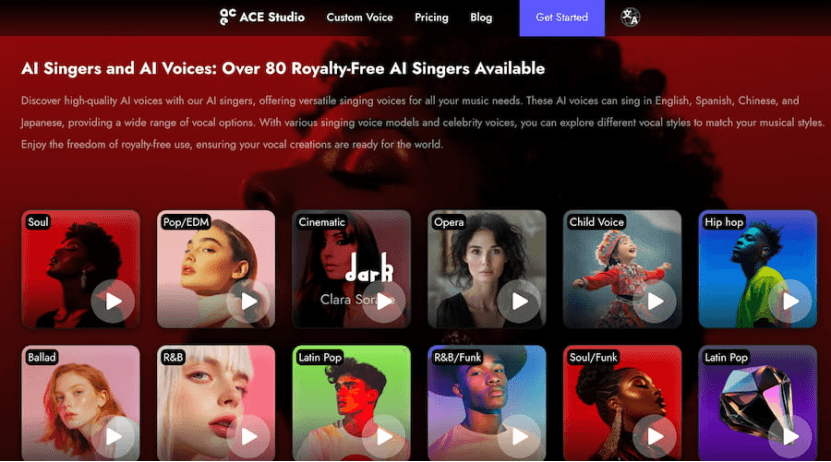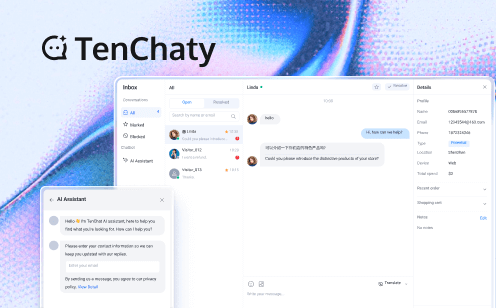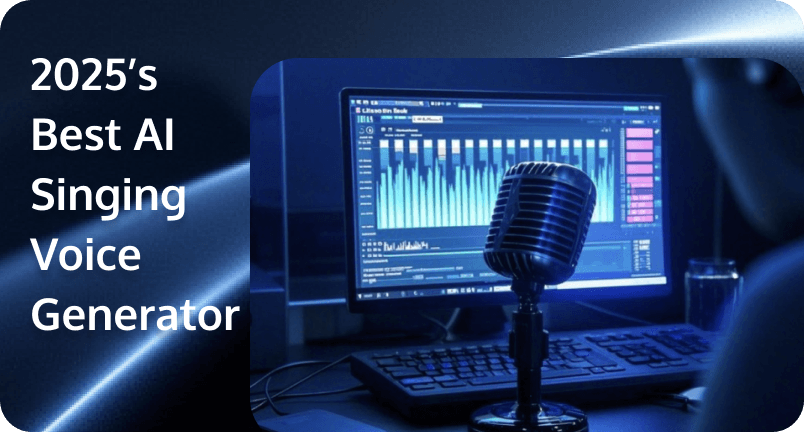2025’s Best AI Singing Voice Generator: Find the right AI Vocalist
AI is reshaping how we create and produce music. If you want to create a song but don’t have the right singer—or any singer at all, an AI singing voice generator might be exactly what you need! These incredible tools let you generate realistic, high-quality vocals without needing a professional singer or expensive studio time.
Whether you’re a music producer, content creator, or just someone who loves experimenting with sound, AI-powered singing generators can help bring your ideas to life. In this guide, you’ll learn why using an AI singing voice generator is a game-changer, discover the best options available in 2025, and get tips on choosing the perfect one for your needs.
Why Use an AI Singer Voice Generator?
If you’ve ever struggled to find the perfect vocalist for your song or wished you could experiment with different singing styles without hiring multiple singers, an AI singing voice generator can be a game-changer. Here’s why:
Instant, High-Quality Vocals: No more waiting for studio sessions or dealing with vocal recording challenges. AI singing voice generators can produce professional-grade vocals in seconds, helping you bring your musical ideas to life quickly and efficiently.
Endless Creative Possibilities: With an AI singer, you’re not limited by a single vocal style or range. You can experiment with different voices, tones, pitches, expressions, and even languages to create a unique sound that fits your vision perfectly.
Budget-Friendly Music Production: Hiring singers and booking studio time can be expensive. AI-powered vocals provide an affordable alternative, allowing independent musicians, producers, and content creators to produce high-quality tracks without breaking the bank.
Perfect for Content Creators & Producers: Whether you’re making music, YouTube videos, animations, or podcasts, an AI singing voice generator can add a professional touch to your projects. You can generate custom vocals for theme songs, jingles, or background music effortlessly.
5 Best AI Singer Voice Generators for 2025
Whether you’re looking for hyper-realistic vocals, unique synthesized voices, or user-friendly interfaces, here are five of the best AI singer voice generators to check out in 2025:
1. ACE Studio
ACE Studio is a cloud-based digital audio workstation that transforms your vocals using advanced singing voice synthesis (SVS) technology. Instead of merely converting audio into another vocal timbre, ACE Studio lets you import or record your own vocals, automatically convert them into MIDI and lyrics, and then adjust pitch, vibrato, and emotional expression.
Its standout features include a voice blending tool (VoiceMix) and an innovative approach to transforming scratch vocals into polished AI-generated performances. While it follows a subscription-based pricing model—with additional voice packs available—it remains a favorite for those who need granular control over every aspect of vocal production.

Best for: Musicians and producers who want a versatile, studio-grade tool with in-depth editing capabilities.
Key Features:
·Custom Voice Models: Train and refine AI models using your own vocal samples.
·VoiceMix Technology: Blend different vocal models to create unique hybrid sounds.
·Editable Parameters: Adjust pitch, tempo, and emotional expressiveness to fit your creative vision.
·Multi-Language Support: Generate vocals in various languages for global projects.
2. Kits AI
Kits AI offers an impressive collection of over 75 artist voices, allowing you to craft unique harmonies, demos, and full vocal tracks. One of its key strengths is the integrated voice cloning feature—you can generate realistic digital replicas from just a short voice sample.
Alongside its AI-driven mixing and mastering functions, Kits AI also emphasizes ethical practices by incorporating a revenue-sharing model for artists whose voices are licensed on the platform. This blend of creative freedom and ethical considerations makes Kits AI a standout option for forward-thinking music producers.
Best for: Producers who want to experiment with a broad library of artist voices and benefit from advanced voice conversion technology.
Key Features:
·Voice Conversion: Easily convert and modify existing vocal recordings with AI-driven precision.
·Customization Options: Adjust parameters such as conversion strength and volume blend for tailored outputs.
·Accessible Pricing: If you’re looking for an AI singing voice generator free no sign up option, Kits AI offers a free basic plan so you can experiment with.
·Streamlined Workflow: Designed to quickly integrate with your current audio editing tools.
3. Vocalist.ai
Vocalist.ai simplifies the process of generating AI vocals, offering an intuitive interface that lets you produce high-quality singing tracks in just a few clicks. You can choose from a range of pre-built voices or clone your own, making it an ideal tool for covers, original songs, or social media content.Vocalist.aighlight its ability to replicate nearly any voice with impressive clarity and naturalness. Its straightforward workflow makes it perfect for those who want to bypass steep learning curves and focus on creative output.
Best for: Creators looking for an easy-to-use, cloud-based platform to generate realistic singing vocals quickly.
Key Features:
·Realistic AI Vocals: Generate high-quality vocals that can blend seamlessly into your tracks.
·Customization Tools: Modify tone, pitch, and style to achieve the desired sound.
·Efficient Workflow: Quick generation and editing streamline your creative process.
4. Synthesizer V
Developed by Dreamtonics, Synthesizer V uses neural network-based synthesis to produce vocals that are almost indistinguishable from human performances. It supports multiple languages and offers several vocal modes to enhance expressiveness.
While it has a steeper learning curve than some cloud-based solutions, its advanced controls—such as real-time pitch adjustment and emotion tweaking—reward users with highly polished results. Available in both free/basic and pro editions (with voice banks sold separately), Synthesizer V is widely acclaimed for its sound quality and flexibility.
Best for: Musicians seeking high-quality, expressive vocals with detailed customization and offline capabilities.
Key Features:
·Realistic Vocal Synthesis: Enjoy hyper-realistic vocals that can convey subtle emotional nuances.
·Multiple Voicebanks: Choose from a variety of voices, with options for different languages and styles.
·Real-Time Editing: Fine-tune vocal characteristics on the fly with advanced control tools.
·Scalable Editions: Start with a basic version and upgrade to a Pro edition for enhanced capabilities.
5. Audimee
Audimee stands out by offering a platform that not only converts your vocals using a range of royalty-free voices but also allows you to train your own custom voice models. This makes it especially attractive for those who want to produce copyright-free cover vocals or unique vocal arrangements without the legal hassle.
In addition to vocal conversion, Audimee supports features like vocal isolation and harmony creation, enabling you to generate complete, layered vocal tracks for a variety of musical genres.
Best for: Independent creators and content producers who need flexible, royalty-free AI vocals with custom training options.
Key Features:
·Royalty-Free Vocal Conversion: Transform existing vocals into professional-sounding tracks without copyright concerns.
·Custom Voice Training: Develop a unique vocal signature by training the AI on your own voice.
·Harmony & Isolation Tools: Easily isolate vocal tracks and create harmonies to enhance your compositions.
·User-Friendly Interface: Designed to be accessible whether you’re a seasoned producer or a beginner.
How to Choose the Best AI Singer Voice Generator?
Selecting the right AI singing voice generator hinges on balancing your creative needs with practical constraints. Here are the key factors to consider when choosing:
Vocal Realism and Quality
One of the most important aspects of an AI singing voice generator is how natural and expressive the vocals sound. Some AI tools create highly realistic, human-like singing voices with emotional depth, while others may have a more robotic or synthesized quality. Listen to sample vocals from different platforms and compare their clarity, pitch accuracy, and expressiveness.
Customization and Editing Options
The best AI singing voice generators allow you to tweak and modify the vocals to fit your creative vision. Key features to look for include:
·Pitch and Vibrato Control: Adjust how notes are sung for a more dynamic performance.
·Emotion and Expression Adjustments: Some AI models let you change the tone, energy, and intensity of the singing.
·Pronunciation and Phoneme Editing: If the AI mispronounces words, having the option to manually adjust phonemes can be useful.
Choose a tool that gives you enough control over vocal performance without being overly complex, unless you’re comfortable with in-depth editing.
Ease of Use
Some AI singing voice generators come with intuitive, user-friendly interfaces, while others require a steeper learning curve. Consider how much time you’re willing to spend learning the software and whether you prefer a plug-and-play solution or something with deeper customization options.
Compatibility with Your Workflow
Think about how the AI singing voice generator will integrate with your existing music production setup. Ask yourself:
·Does it support MIDI input for precise control?
·Can you export vocals as WAV or MP3 files for easy mixing?
·Does it work with your DAW (Digital Audio Workstation)?
Language and Accent Support
If you need vocals in a specific language or accent, check whether the AI model supports it. Some tools specialize in English vocals, while others offer multilingual support with varying levels of accuracy.
Licensing and Usage Rights
Understand the licensing terms associated with the generated vocals. Ensure that the platform provides clear guidelines on commercial use, royalties, and ownership. Opting for services that offer royalty-free vocals can simplify legal considerations and allow for broader distribution of your work.
Pricing and Subscription Model
If you’re looking for an AI singing voice generator free, most options work on a freemium model, giving you a limited free trial. Some let you purchase a one-time license, while others require a monthly or yearly subscription to keep using them.
Empowering Developers with AI Singing Voice Generators: TRTC’s Conversational AI
If you’re a developer looking to build the next generation of AI singing voice generators, integrating real-time AI-powered audio solutions is essential. A seamless, high-quality audio interaction framework can enhance the responsiveness and realism of AI-generated vocals. That’s where TRTC comes in handy!
Deliver AI-based real-time audio and video interaction to your platform with TRTC’s Conversational AI solution, enabling a more intelligent and natural user experience. Whether you’re developing an AI singing voice generator, voice synthesis application, or interactive AI music platform, TRTC provides the essential tools for smooth, human-like audio processing.
Why Choose Tencent RTC for AI Singing and Voice Applications?
Ultra-low Latency: Achieve global audio/video transmission under 300ms and real-time conversation latency under 1,000ms, ensuring seamless AI-generated singing that feels organic.
Efficient Deployment: Leverage a code-free Playground for quick testing and integrate the solution within 2-3 days using comprehensive SDKs and APIs, cutting development time and costs.
Leading Audio Processing: Take advantage of AI-driven noise suppression and 3A echo cancellation, providing clear, high-fidelity vocal synthesis ideal for AI singing applications.
Flexible Provider Stack: Compatible with top Large Language Models (LLM), Automatic Speech Recognition (ASR), and Text-to-Speech (TTS) models, making integration seamless with customizable AI configurations.
Human-like Natural Conversations: The Voice Activity Detection (VAD) system ensures intelligent interruption and natural rhythm, mimicking human-like singing and conversational AI interactions.
Global Network Coverage: With availability in over 200 countries, Tencent RTC ensures high-quality audio transmission even in weak network environments.
Privacy and Security: Advanced encryption and compliance-ready privacy protection safeguard user data, making it a reliable choice for AI applications in music, social media, and entertainment.
Conclusion
AI singing voice generators are making music creation easier, more accessible, and more fun than ever before. Whether you’re looking to add vocals to a track, experiment with different voices, or simply explore new creative possibilities, these tools can take your projects to the next level. The key is finding the right one that fits your needs—whether it’s ultra-realistic vocals, customization options, or user-friendly features. With AI technology advancing every day, now is the perfect time to start experimenting and see how an AI singing voice generator can transform the way you make music!
FAQs
What is the best free AI singing voice generator?
The best free AI singing voice generator depends on your needs, but some popular options include Ace Studio (Free Trial) and Kits AI (Free Plan). These tools offer realistic AI vocals, text-to-singing capabilities, and customization options without requiring payment. However, free versions often come with limitations, such as fewer voice models or restricted usage time. If you’re looking for completely free AI singing tools, explore community-driven platforms or open-source alternatives.
Is there an AI that changes singers’ voice?
Yes, AI tools can transform singers’ voices by emulating different vocal styles or specific artists. For instance, platforms like ACE Studio and Voice-Swap allow users to modify their vocals, enabling creative possibilities such as voice swapping and style transformation. Additionally, open-source projects like Retrieval-based Voice Conversion (RVC) provide algorithms that enable realistic speech-to-speech transformations, accurately preserving the intonation and audio characteristics of the original speaker.
Are AI-generated vocals legal to use in commercial projects?
In most cases, AI-generated content without human creative input is not copyrightable. Using AI vocals that mimic real artists without permission can violate their rights, as seen in cases where labels like Sony Music have taken down unauthorized deepfake recordings. Laws vary by region—for example, Tennessee’s ELVIS Act protects artists from AI voice replication. To avoid legal risks, always check the licensing terms of AI-generated vocals and consult legal experts if needed.



